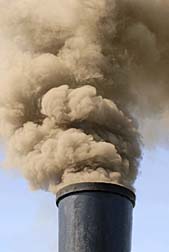 Total Petrochemical USA Inc. (Total) will pay an $8.75 million penalty for failing to comply with the terms of a 2007 settlement with the United States that resolved alleged violations of the Clean Air Act at its Port Arthur, Texas, refinery, the Department of Justice and the U.S. Environmental Protection Agency (EPA) announced today.
Total Petrochemical USA Inc. (Total) will pay an $8.75 million penalty for failing to comply with the terms of a 2007 settlement with the United States that resolved alleged violations of the Clean Air Act at its Port Arthur, Texas, refinery, the Department of Justice and the U.S. Environmental Protection Agency (EPA) announced today.Between 2007 and 2011, Total violated numerous requirements of the 2007 settlement, including failing to comply with emissions limits for benzene, a harmful air pollutant. The company also failed to perform corrective actions or to analyze the cause of over 70 incidents involving emissions of hazardous gases through flaring. EPA discovered the violations through a review of the quarterly compliance reports required by the 2007 settlement.
The 2007 settlement required that Total pay a $2.9 million penalty and make upgrades to its facility to reduce emissions of harmful air pollution to resolve Clean Air Act violations. The 2007 settlement further required that Total upgrade leak detection and repair practices and implement programs to minimize flaring, which can result in emissions of gases that can cause serious respiratory problems and exacerbate asthma.
“Total failed repeatedly to adhere to obligations they willingly took on when they settled with the United States in 2007. These are court-enforceable requirements for the protection of the health of their Texas neighbors, not simply the cost of doing business,” said Robert G. Dreher, Acting Assistant Attorney General for the Justice Department’s Environment and Natural Resources Division. “Companies that settle with the United States must meet their obligations or there will be consequences, as this significant penalty demonstrates.”
“EPA has been working with local officials, community leaders and organizers, and local industry to improve living conditions for residents of Port Arthur. These efforts have already produced results, especially with the opening of the Westside Health Clinic,” said EPA Regional Administrator Ron Curry. “Clean air is essential for keeping communities healthy. EPA will continue its efforts to hold companies accountable for violating our nation’s environmental laws and meeting our enforcement orders and decrees.”
In addition to the penalty, today’s action extends the requirement that Total comply with a lower benzene emissions limit for an additional two years. The enhanced limit for benzene, which is 30 percent lower than the federal limit, was initially required by the 2007 settlement. In addition, Total must hire a third-party to audit its compliance under the settlement and must implement a company task force to monitor its compliance.
Reducing illegal emissions of toxic air pollutants at facilities that have a significant impact on air quality and health in communities is one of EPA’s national enforcement priorities.
Exposure to high concentrations of sulfur dioxide (SO2), a key pollutant emitted from refineries, can affect breathing and aggravate existing respiratory and cardiovascular disease, particularly in children and in the elderly. SO2 is converted in the air into fine particulate matter, which can harm health through decreased lung function, aggravated asthma, and premature death in people with heart or lung disease. Chronic exposure to benzene, a volatile organic compound which EPA classifies as a carcinogen, can cause numerous health impacts, including leukemia and adverse reproductive effects in women.
Total is a refiner and petrochemical manufacturer whose products include automotive fuels, lubricantsand liquefied petroleum gas . Total processes approximately 230,000 barrels per day of crude oil.
The settlement, lodged in the U.S. District Court for the Eastern District of Texas, is subject to a 30-day public comment period and court approval. The settlement will be available for viewing atwww.justice.gov/enrd/Consent_Decrees.html . The claims resolved by this settlement are only allegations and there has been no determination of liability.





Comments are closed.